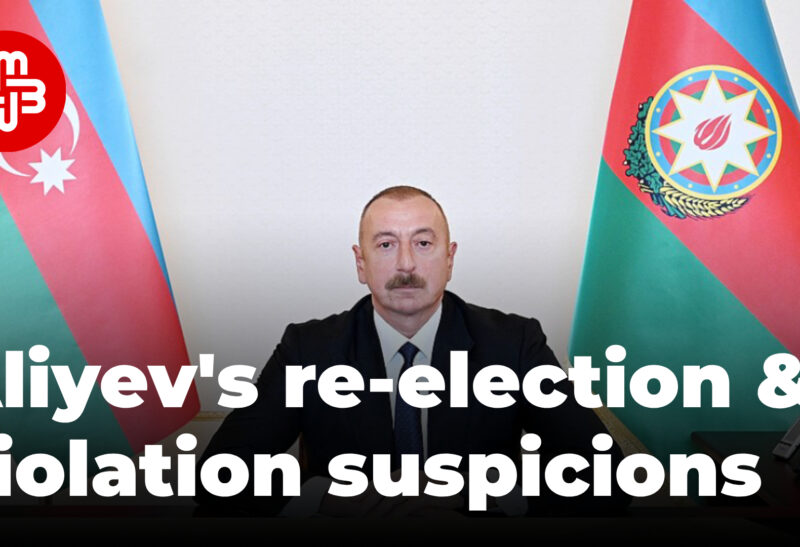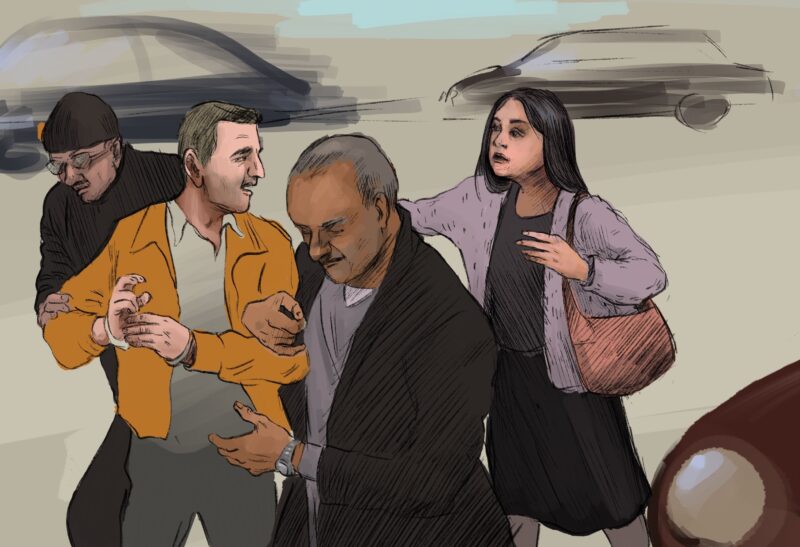
Iraqi MP from Kirkuk, Ali Mehdi, has been in Azerbaijan for several days now. Born in Kirkuk in 1957, he graduated with a degree in civil engineering in the 80s. He immigrated to Germany in 1997 because of political tension in the country, and returned after Saddam’s departure from power in 2003.
He currently represents the country’s Turkmen population, who reside predominantly in Kirkuk. He is also the secretary of the Iraqi – Turkmen front. We met with Mehdi who agreed to an interview with Meydan TV to discuss current events in Iraq and its Turkmen population.
***
Ali Bey, when you returned to Iraq from Germany where you lived in such security, did you imagine that the war would go on for so long after your return?
We have our own war and our own beliefs: and that is to secure the existence and history of the Turkmen in Iraq. For more than 100 years, the Iraqi Turkmen have been living in poverty and distress. But there is a way forward in which we sincerely believe, and we will try to follow this path until the end. We believe that in order for there to be a successful end of the war, we must remain in Iraq, in Kirkuk and defend our language and territory together with these people.
What is currently happening in Iraq? Is the war which has been going on for so long connected to power over oil, geopolitical interests or religious currents?
Unfortunately, after 2003, the USA totally destroyed the Iraqi government. In the end, we understood that the American army did not arrive in Iraq to take down the dictatorship and to ensure the security of the country. Instead, they came for the oil. Unfortunately, the policy of Washington in Iraq is based on the slogan “divide, conquer and take advantage.” In such a fashion, after 2003, there started a number of conflicts in Iraq which did not exist before between religious groups. Currently, religious conflicts between Sunnis and Shi’ites and ethnic conflicts between Kurds, Arabs and the Turkmen are a matter of daily life. Today in Iraq the power belongs to the side that has power, weapons. Law and the constitution are of no importance. Starting from 2014, that is, after ISIS had already seized a large portion of the country, the situation became even more tense, and the Turkmen suffered more than anyone else because of this.
You claim that the USA created the current situation in Iraq because of its oil interests, but Washington began working on shale oil production in the beginning of the century. Which would mean that the USA’s oil interests should, correspondingly, not be so large. Do you agree with this?
I’m not only talking about the oil factor here. The thing is that the resolution of conflicts in the Middle East was also part of the plan of the United States. After America entered Iraq in 2003, oil reached new highs, and for a while was selling at more than $130 a barrel. And only two years ago did it fall from $100 to $40 – 50 a barrel. America and the European nations were buying oil from the nations of the Middle East after their interests in oil had been put on the back burner. As a result, the oil price fell. The thing is that in the region, there are interests of oil and there are interests in weakening entire states. We are literally talking about the changing of borders.
Where is Iraqi oil sold? Who buys it?
I live in Kirkuk and I am an official of Kirkuk Oil Company. We ask about the final destination of our product, and even he doesn’t know. The thing is that oil is under the control of the central Iraqi authority. Currently, 2 Kurdish parties control oil in Kirkuk, I mean the Talaban and the Barzani.
Do they have issues between themselves?
Yes, and this conflict will only grow over the years.
Why can’t they share, given that they are both Kurds?
The incident is again connected with oil, Kirkuk is the second largest city in Iraq and there is oil there. Neither in Erbil nor in Suleyman is there oil, and they have their own economic interests. Oil in Iraq is extracted only in Mosul, Basra and Kirkuk. For any state to survive it has to have a strong economy. And Iraq’s economy consists only of oil; other industries don’t exist here. If one of the local nationalities takes oil under its control, then it will be able to survive, because it will be able to strengthen its economy with the help of oil. As a result, it will buy weapons in order to form an army to defend itself.
To what extent has oil benefited Iraqis?
I don’t think Iraq has seen any benefit from oil. I am 60 years old, and never in my lifetime have I seen oil’s good sides. It has brought only war, conflict and misfortune. During the reign of Saddam, we had the 8 – year war with Iran, and we didn’t get anything out of that.
What is the current ethnic makeup of Iraq today?
Currently, the armed groups are the ones that dominate. And the armed groups are almost all entirely Shi’ite. Few Sunni groups have weapons. The Kurds – the Peshmerga – have an army of about 100,000 strong. We Turkmen have about 5 – 6,000 soldiers. But Iraq is under the control of Iran and the United States of America. Imagine for a moment: 70 percent of the country is under the control of Iran. The reason is that 60 percent of the population is Shi’ite, who are represented by 200 MPs in the parliament. They close their eyes to the interference of Iran in Iraq. Unfortunately, the local population has already forgotten that they live in Iraq. Can you believe it – 32 States are leading covert and military operations in Iraq. Aside from Iran, none of the others are Muslim states. They won’t allow Turkey into the country, but Irani soldiers and advisors are found across the country.
It’s interesting that when the USA began the Iraq War in 2003, relations with Iran were tense. What has changed and brought these two countries together?
As I said before, 70 percent of the parliament is composed of Shi’ites. And their influence is so strong that no one asks what Iran is doing in Iraq. But everyone was discussing the 200 Turkish soldiers that somehow got in. I think that the current events are a result of a secret agreement between Washington and Teheran.
Do you think that Ankara has been acting appropriately in this situation?
Turkey is in a difficult position, surrounded by wars. Just look at Syria and Iraq. This war has not allowed Ankara to openly interfere in the processes of these countries. Europe and America have
it in for Turkey and they organize political and strategical attacks against her. Which means that Turkey is essentially paralyzed in the region. Nonetheless, after 2003, Iraqis, especially Turkmen, were receiving aid from Turkey above all.
After the 1920s, the Turkmen in Iraq were assimilated. How many Turkmen have remained in the country?
Up until 2003, the population of Kirkuk was about 850,000, 60 percent of which (500,000) were Turkmen. Today, only about 20 percent of Kirkuk – which has grown to a size of about 1,400,000 residents. The policies of recent years have lead to an influx of Kurds into the region. On average, the number of Turkmen in Iraq is about 2 – 3 million. The Kurds number about 5 million. Unfortunately, after 2003, the Turkmen were attacked in Mosul, Kirkuk and Telafer by various armed groups. The central authority of Iraq was silent about this genocide.
How reliable are predictions of the end of the ISIS?
ISIS is still in Mosul and Telafer. From there, it will have to move into Syria, and when its presence there will be totally expelled is still as of yet unknown. But what life will be like after ISIS is also unknown….will the peshmerga relinquish the territories they have taken during the fighting? These questions are difficult to answer. In short, we have many problems awaiting us after ISIS. I assume that there will be continued conflicts between sunnis and shiites, Arabs and Kurds.
You noted that in the parliament, the majority of the MPs are Shi’ites. But how about the leadership itself?
The leadership is also largely composed of Shi’ites. More than 70%. The majority of those who serve in the army and the police – for example, the so – called national army of the People’s Mobilization Forces was created by Shi’ites. And Teheran supports it.
What are you expecting from Turkey?
We expect support not only from Turkey, but from all of the Turkic – speaking world. Our forefathers came through Azerbaijan. For that reason I believe all the Turkic states can understand and help solve the problems of the Turkmen in Iraq. That is, in the fields of culture, health and education. Maybe Azerbaijan and other Turkic states know that in Iraq there are 3 million Turkmen. And they know that they are in a difficult situation. But let me tell you something. As a Turkmen, I am myself against the idea of receiving Turkish citizenship. If Ankara opens its doors, than half of Iraqi Turkmen would leave. And our lands of Kirkuk and Turkmeneli would be abandoned. Turkey has supported us well in the past, but in order for us to really stand up on our legs we need a different sort of support. For example, support in the fields of medicine, economy, education and culture. We don’t have universities that teach in Turkmen, only schools.
If these problems continue, what do you see happening in the future?
This is the 100 – year war of the Turkic peoples. And we will continue our struggle in Kirkuk and Telafer, Mosul. Nothing will stop us.



